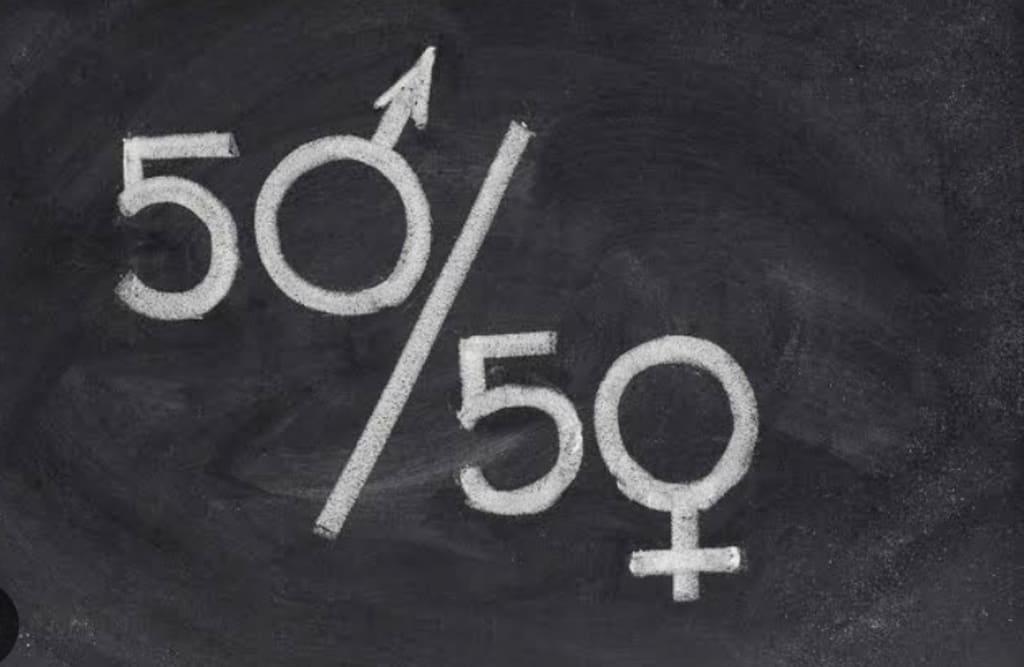Content warning
This story may contain sensitive material or discuss topics that some readers may find distressing. Reader discretion is advised. The views and opinions expressed in this story are those of the author and do not necessarily reflect the official policy or position of Vocal.
Title: Gender Equality
Striving for a More Inclusive and Equal Society

Title: Gender Equality: Striving for a More Inclusive and Equal Society
Introduction:
Gender equality is a fundamental principle that promotes the equal rights, opportunities, and treatment of all genders. It is a crucial aspect of creating a just and inclusive society. This essay explores the importance of gender equality, the challenges that persist, and the steps needed to achieve a more equitable future for all.
Understanding Gender Equality:
Gender equality refers to the equal access and opportunities available to individuals regardless of their gender. It recognizes that every individual should have the right to make choices, pursue their aspirations, and contribute to society without discrimination based on gender. Gender equality encompasses various aspects, including economic, social, political, and cultural spheres.
The Importance of Gender Equality:
Gender equality is vital for several reasons. First and foremost, it upholds human rights, ensuring that every individual has equal value and dignity. It fosters social cohesion, promotes peace, and reduces violence by challenging harmful gender stereotypes and discrimination. Additionally, gender equality contributes to economic growth and development by harnessing the full potential of all individuals.
Challenges to Gender Equality:
Despite significant progress, gender inequality persists in various forms. Gender-based violence, unequal access to education and healthcare, limited economic opportunities, and underrepresentation in leadership roles are just a few examples. Harmful gender norms and stereotypes continue to shape societal expectations, limiting individuals' choices and perpetuating inequality. Intersectionality, recognizing the interconnected nature of gender with other social identities, highlights additional challenges faced by marginalized groups.
Promoting Gender Equality:
Achieving gender equality requires collective action and a multifaceted approach. Education plays a pivotal role in challenging stereotypes, promoting gender awareness, and empowering individuals to challenge gender norms. Legislation and policies that protect women's rights, promote gender parity, and address systemic discrimination are essential. Economic empowerment, including access to financial resources, equal pay, and support for women-owned businesses, is crucial for closing the gender wealth gap.
Creating Inclusive Workplaces:
Promoting gender equality in the workplace is vital. It involves eliminating gender-based discrimination, ensuring equal pay for equal work, and providing equal opportunities for career advancement. Companies can implement policies such as flexible work arrangements, parental leave, and diversity and inclusion initiatives to create inclusive work environments. Promoting leadership opportunities for women and fostering a culture of respect and inclusion are also key.
Engaging Men and Boys:
Gender equality is not solely a women's issue; it requires the engagement and support of men and boys as allies. Promoting positive masculinity and challenging harmful stereotypes is crucial in breaking down gender barriers. Encouraging men to actively participate in caregiving, domestic chores, and promoting equal partnerships fosters more balanced gender roles and contributes to a more equitable society.
Addressing Gender-Based Violence:
Gender-based violence is a significant obstacle to gender equality. It requires comprehensive efforts, including prevention, awareness, support services, and legal measures to combat violence against women and other gender-based violence. Promoting respectful relationships, consent education, and providing safe spaces for survivors are critical steps in eradicating gender-based violence.
Promoting Representation and Participation:
Equal representation and participation of women and marginalized genders in decision-making processes are essential for achieving gender equality. This includes political representation, leadership roles in organizations, and participation in public discourse. Creating opportunities for diverse voices to be heard and actively addressing barriers to participation are key in creating more inclusive societies.
Conclusion:
Gender equality is a fundamental principle that drives social progress and fosters a more inclusive and equal society. By challenging gender stereotypes, addressing systemic discrimination, and promoting equal opportunities, we can create a world where every individual, regardless of their gender, can fully realize their potential. Achieving gender equality requires collective action, legislation, education, and a commitment to dismantling barriers. Let us strive for a future where gender equality





Comments
There are no comments for this story
Be the first to respond and start the conversation.